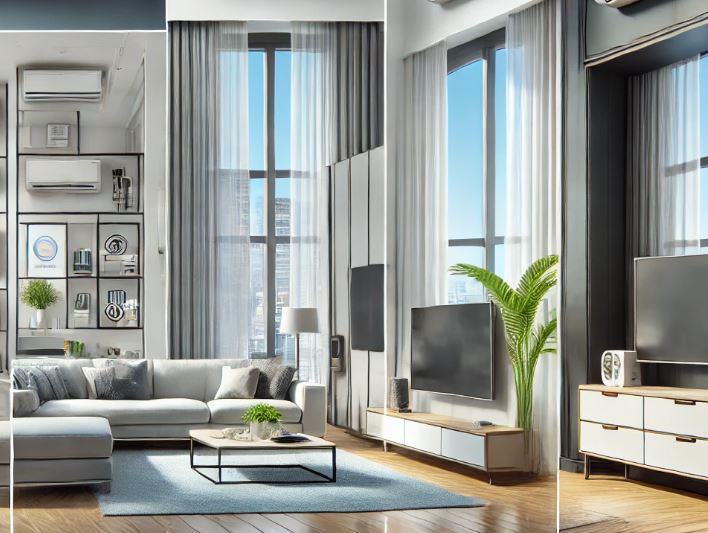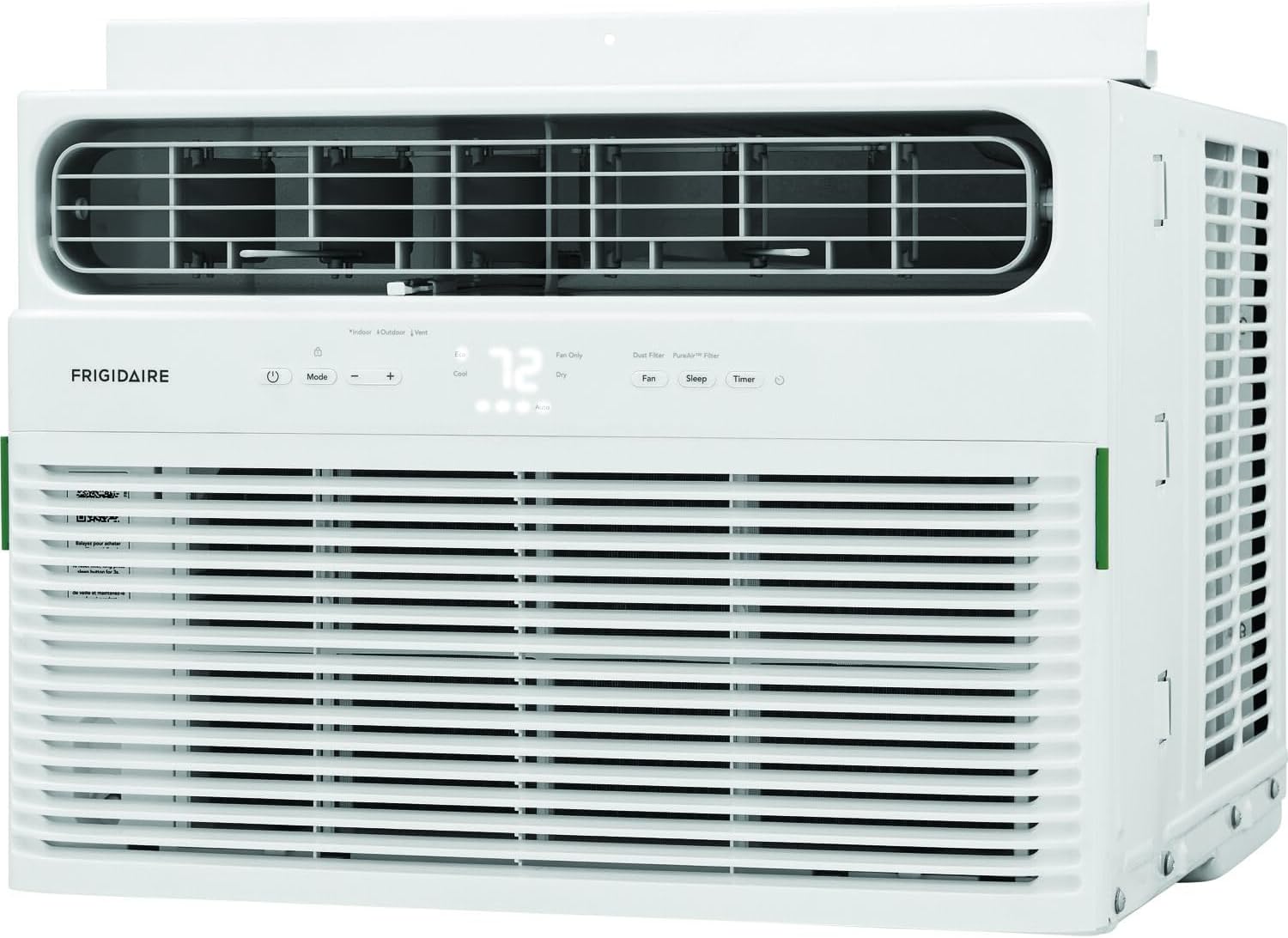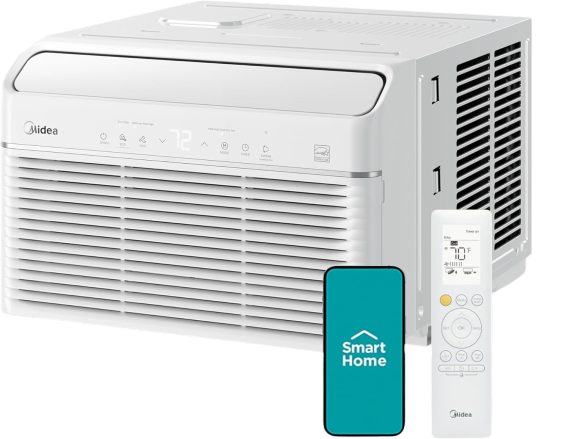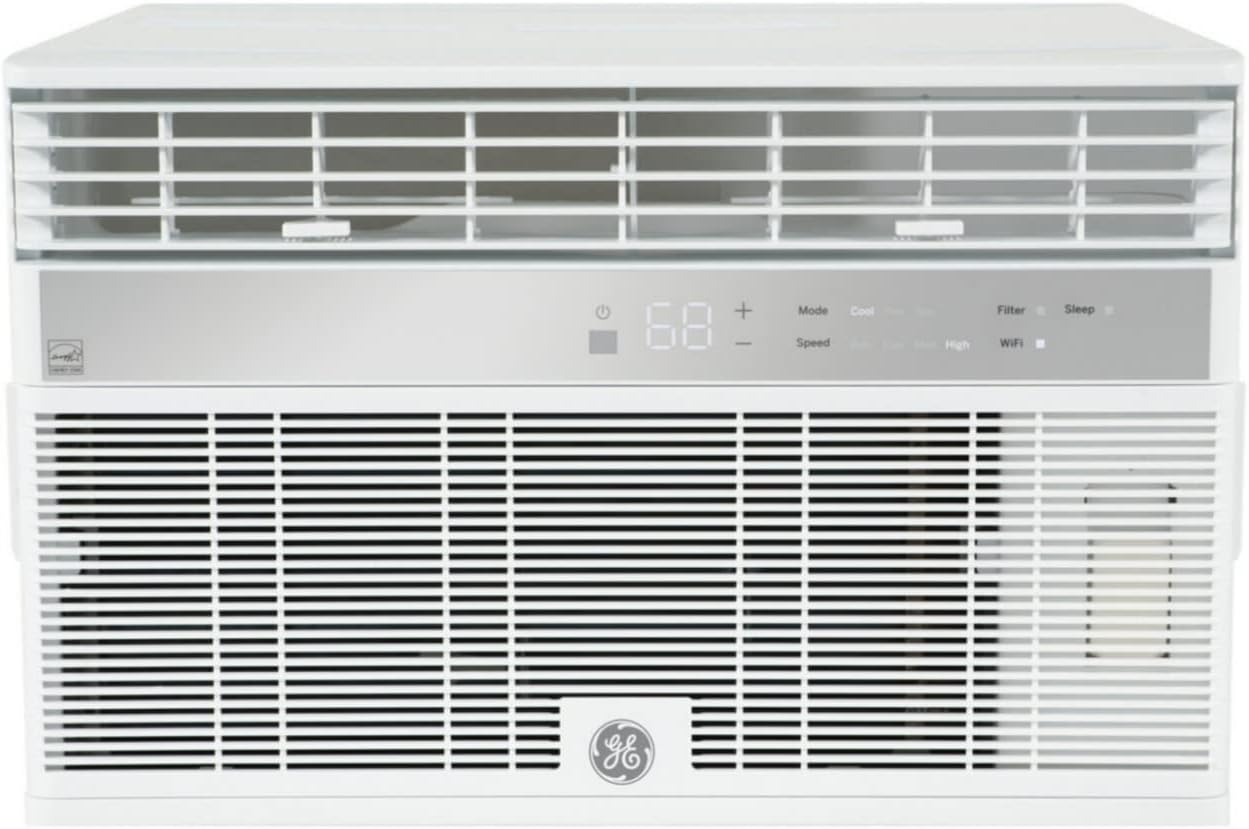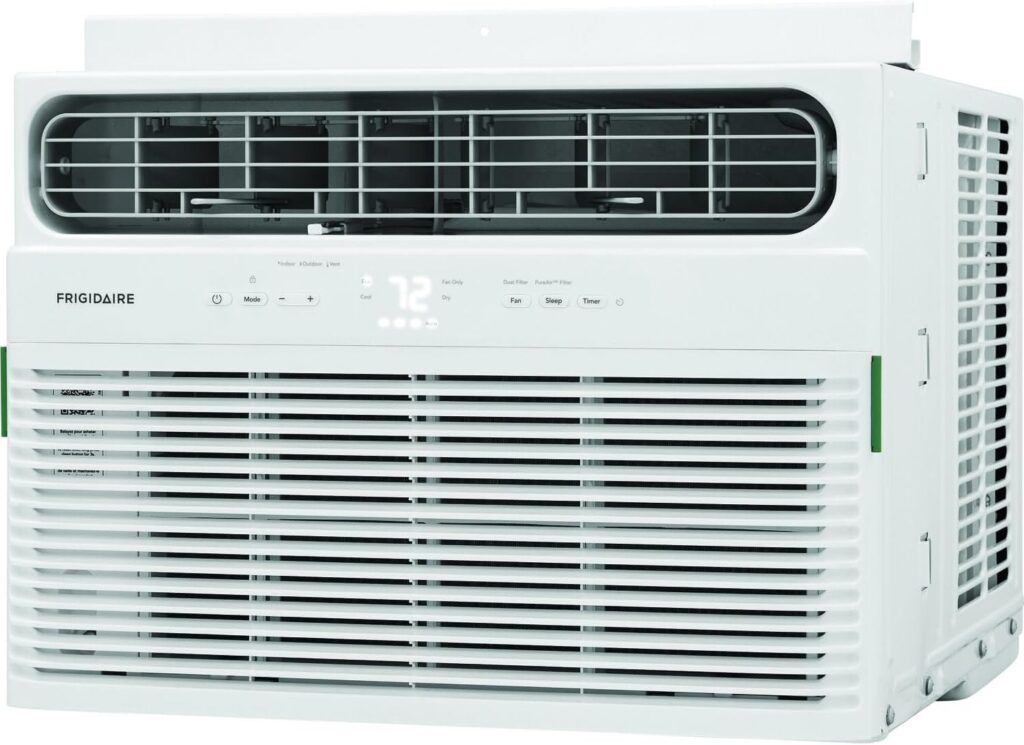I'm a participant in the Amazon Services LLC Associates Program, an affiliate advertising program designed to provide a means for me to earn fees by linking to Amazon.com and affiliated sites.
Selecting the best window air conditioner for a large room can be challenging with the variety of options available today. This guide narrows down the top five models based on performance, efficiency, and user reviews. Each model offers unique features, catering to different preferences and needs.
Product | Cooling Capacity | Energy Efficiency | Smart Features | Noise Level | Price | |
|---|---|---|---|---|---|---|
12,000 BTU | Moderate | No | Moderate | |||
12,000 BTU | High (Energy Star) | No | Moderate | |||
12,000 BTU | High (Inverter) | No | Low | |||
12,000 BTU | Moderate | Yes (Wi-Fi) | Low | |||
12,000 BTU | Moderate | Yes (Voice Control) | Moderate |
Recommended Models
- LG LW1216ER: Known for its powerful cooling and programmable timer.
- Frigidaire FFRE123WAE: Energy Star certified with a user-friendly interface.
- Midea U Inverter: Ultra-quiet and energy-efficient with a unique design.
- Friedrich Chill Premier: Wi-Fi enabled for smart home integration.
- GE AHY12LZ: Offers voice control and robust cooling capacity.
Top 5 Models for Large Rooms
1. LG LW1216ER 12,000 BTU Window Air Conditioner
The LG LW1216ER is a powerful and efficient window air conditioner, perfect for cooling large rooms. It boasts multiple cooling speeds and a programmable timer for customized comfort.
2. Frigidaire FFRE123WAE 12,000 BTU Window-Mounted Room Air Conditioner
Frigidaire’s FFRE123WAE offers robust cooling power and a user-friendly interface. Its Energy Star certification ensures efficient energy use without compromising performance.
3. Midea U Inverter Window Air Conditioner 12,000 BTU
Midea U Inverter is known for its ultra-quiet operation and energy efficiency. Its unique U-shaped design allows the window to open, providing flexibility and security.
4. Friedrich Chill Premier 12,000 BTU Smart Window Air Conditioner
Friedrich Chill Premier is a smart air conditioner with Wi-Fi capabilities, allowing control through a smartphone app. It’s designed for quiet operation and includes a washable filter for easy maintenance.
5. GE AHY12LZ Smart Window Air Conditioner 12,000 BTU
The GE AHY12LZ combines smart home integration with powerful cooling. It offers voice control via Alexa and Google Assistant, making it a convenient choice for tech-savvy users.
Pros and Cons of Each Product
LG LW1216ER
Pros:
- Powerful cooling capacity.
- Programmable timer.
- Multiple cooling speeds.
Cons:
- Slightly noisy operation.
- Bulky design.
- Higher energy consumption.
Frigidaire FFRE123WAE
Pros:
- Energy Star certified.
- User-friendly interface.
- Excellent cooling performance.
Cons:
- Higher initial cost.
- Somewhat bulky.
- Limited smart features.
Midea U Inverter
Pros:
- Ultra-quiet operation.
- Energy efficient.
- Unique U-shaped design.
Cons:
- Complicated installation.
- Higher price point.
- Limited cooling speed options.
Friedrich Chill Premier
Pros:
- Wi-Fi enabled.
- Quiet operation.
- Washable filter.
Cons:
- Expensive.
- Requires frequent filter cleaning.
- Limited availability.
GE AHY12LZ
Pros:
- Smart home integration.
- Voice control compatibility.
- Strong cooling capacity.
Cons:
- High price.
- Slightly noisy.
- Requires stable Wi-Fi connection.
Major Differences Between the Models
Cooling Capacity
While all models offer a 12,000 BTU rating, their effectiveness can vary based on room size and insulation. The LG LW1216ER and GE AHY12LZ are noted for their robust cooling power, making them ideal for larger spaces.
Energy Efficiency
The Midea U Inverter stands out with its inverter technology, providing superior energy efficiency compared to traditional models. The Frigidaire FFRE123WAE also performs well with its Energy Star certification.
Smart Features
For those seeking smart home compatibility, the Friedrich Chill Premier and GE AHY12LZ offer advanced features such as Wi-Fi control and voice commands, enhancing convenience and integration with modern home systems.
Noise Levels
Noise can be a crucial factor, especially in bedrooms or living areas. The Midea U Inverter and Friedrich Chill Premier are designed for quieter operation, providing a more comfortable environment.
Design and Installation
The Midea U Inverter’s unique design allows for better window access and security. However, its installation can be more complex. In contrast, the LG LW1216ER and Frigidaire FFRE123WAE offer straightforward installation processes.
Buyer’s Guide
What to Look for in a Window Air Conditioner for Large Rooms
Choosing the right window air conditioner for a large room involves considering several critical factors:
Cooling Capacity
Measured in BTUs (British Thermal Units), cooling capacity is crucial for ensuring the unit can adequately cool your space. For large rooms, look for units with at least 12,000 BTUs.
Energy Efficiency
Energy-efficient models reduce electricity consumption and save on energy bills. Look for Energy Star certified models or those with inverter technology for optimal efficiency.
Noise Level
Quiet operation is essential, especially if the unit is for a bedroom or living area. Check the decibel rating to ensure the unit won’t disrupt your environment.
Smart Features
Modern air conditioners offer smart features like Wi-Fi connectivity, app control, and voice commands. These features provide added convenience and can integrate with other smart home devices.
Ease of Installation
Consider the ease of installation and whether the unit’s design suits your window type. Some models, like the Midea U Inverter, may require more complex installation.
Window Air Conditioner for Large Room Advantages and Disadvantages
Advantages
Efficient Cooling
Window air conditioners for large rooms are designed to provide efficient and powerful cooling, ensuring comfort even in the hottest months.
Cost-Effective
Compared to central air conditioning systems, window units are generally more affordable both in terms of initial purchase and operating costs.
Easy Installation
Most window air conditioners can be installed without professional help, making them a convenient option for many homeowners.
Versatility
These units can be used in various settings, including homes, offices, and rental properties, providing flexibility in cooling different types of spaces.
Disadvantages
Noise
Some window air conditioners can be noisy, which may be disruptive in bedrooms or quiet areas. It’s essential to check the noise level before purchasing.
Limited Coverage
Even the most powerful window units have a limited coverage area, making them unsuitable for extremely large or open-plan spaces.
Aesthetic Impact
Window units can obstruct the view and affect the exterior appearance of your home. Some may find them less visually appealing.
Regular Maintenance
Window air conditioners require regular maintenance, such as cleaning or replacing filters, to ensure optimal performance and longevity.
How Large Does My AC Need to Be?
Calculating BTUs for Your Room Size
Determining the appropriate BTU rating for your room size ensures efficient cooling and energy use. Here’s a general guideline:
- Up to 350 sq. ft.: 8,000 BTUs
- 350 – 550 sq. ft.: 10,000 BTUs
- 550 – 800 sq. ft.: 12,000 BTUs
- 800 – 1,200 sq. ft.: 14,000 BTUs
- 1,200 – 1,500 sq. ft.: 18,000 BTUs
Factors Influencing BTU Needs
Room Insulation
Rooms with good insulation require less cooling power. Poorly insulated rooms might need a higher BTU rating to maintain a comfortable temperature.
Ceiling Height
Standard BTU recommendations are based on 8-foot ceilings. Higher ceilings may require additional cooling capacity.
Sun Exposure
Rooms with significant sun exposure, especially those facing south or west, may need a unit with higher BTUs to counteract the heat.
Room Usage
Consider the room’s usage and the number of occupants. Spaces with high activity levels or multiple occupants will generate more heat, necessitating a more powerful air conditioner.
Recent Developments in the Field
In recent years, advancements in air conditioner technology have focused on improving energy efficiency and incorporating smart features. The introduction of inverter technology, as seen in the Midea U Inverter, has revolutionized the market by offering significant energy savings and quieter operation. Additionally, the integration of smart home features, such as those in the Friedrich Chill Premier and GE AHY12LZ, allows users to control their air conditioners remotely, enhancing convenience and functionality.
Top Experts and Entities in the Field
Several leading experts and organizations are shaping the air conditioning industry. The U.S. Department of Energy regularly updates guidelines and standards to promote energy efficiency in HVAC systems. The American Society of Heating, Refrigerating and Air-Conditioning Engineers (ASHRAE) is another key entity, providing research and recommendations for improving indoor air quality and energy use. Companies like Carrier and Daikin continue to innovate, introducing new models that set benchmarks for performance and efficiency.
Author
HappyHomeNerd is an expert in home appliances and HVAC systems with many years of experience in the field. Their insights and reviews help consumers make informed decisions for a comfortable and energy-efficient home.
Conclusion
Choosing the right size air conditioner for your large room involves assessing various factors, including room size, insulation, ceiling height, sun exposure, and usage. Properly matching the BTU rating to your specific needs ensures efficient cooling, energy savings, and overall comfort. For more information on choosing the right cooling solutions, check out our reviews on the Best Desk Fan and comparisons like Midea vs LG ThinQ.
Also Read
Enhance your understanding and explore more cooling solutions with our detailed reviews and comparisons:
- Discover the Best Desk Fan for a refreshing breeze at your workspace.
- Learn about the Best Window AC Unit 6000 BTU for smaller rooms.
- Compare the features of Midea vs LG ThinQ to find the best smart air conditioner.
- Understand the differences between Midea vs LG Dual Inverter for advanced cooling technology.
- Check out our comparison of Midea vs Frigidaire to choose the right model for your home.
FAQ – The Best Window Air Conditioner for Large Room
What is the best window air conditioner for a large room?
The best window air conditioner for a large room depends on specific needs, such as energy efficiency, noise levels, and smart features. Top models include the LG LW1216ER, Frigidaire FFRE123WAE, and Midea U Inverter.
How does inverter technology improve air conditioners?
Inverter technology enhances air conditioners by adjusting the compressor speed to maintain the desired temperature, resulting in lower energy consumption and quieter operation.
Are smart air conditioners worth the investment?
Smart air conditioners, like the Friedrich Chill Premier and GE AHY12LZ, offer convenient features such as remote control and voice commands, making them a worthwhile investment for tech-savvy users.
What factors should I consider when choosing a window air conditioner?
Key factors to consider include cooling capacity, energy efficiency, noise levels, smart features, and ease of installation. Each factor impacts the overall performance and suitability for your space.
How can I improve the efficiency of my window air conditioner?
To improve efficiency, ensure proper installation, clean or replace filters regularly, and use programmable settings to optimize cooling based on your schedule.
Which air conditioner is the quietest?
The Midea U Inverter and Friedrich Chill Premier are designed for quieter operation, making them ideal for bedrooms and living areas.
Do all window air conditioners require professional installation?
Most window air conditioners can be installed by homeowners following the manufacturer’s instructions. However, models with unique designs, like the Midea U Inverter, may benefit from professional installation.
Can I control my air conditioner with my smartphone?
Yes, smart air conditioners like the Friedrich Chill Premier and GE AHY12LZ offer Wi-Fi connectivity, allowing control through smartphone apps.
What is the benefit of an Energy Star certified air conditioner?
Energy Star certified air conditioners, such as the Frigidaire FFRE123WAE, meet stringent energy efficiency standards, reducing electricity bills and environmental impact.
How often should I clean the filter in my window air conditioner?
It is recommended to clean the filter every 30 days during peak use to maintain optimal performance and indoor air quality.
